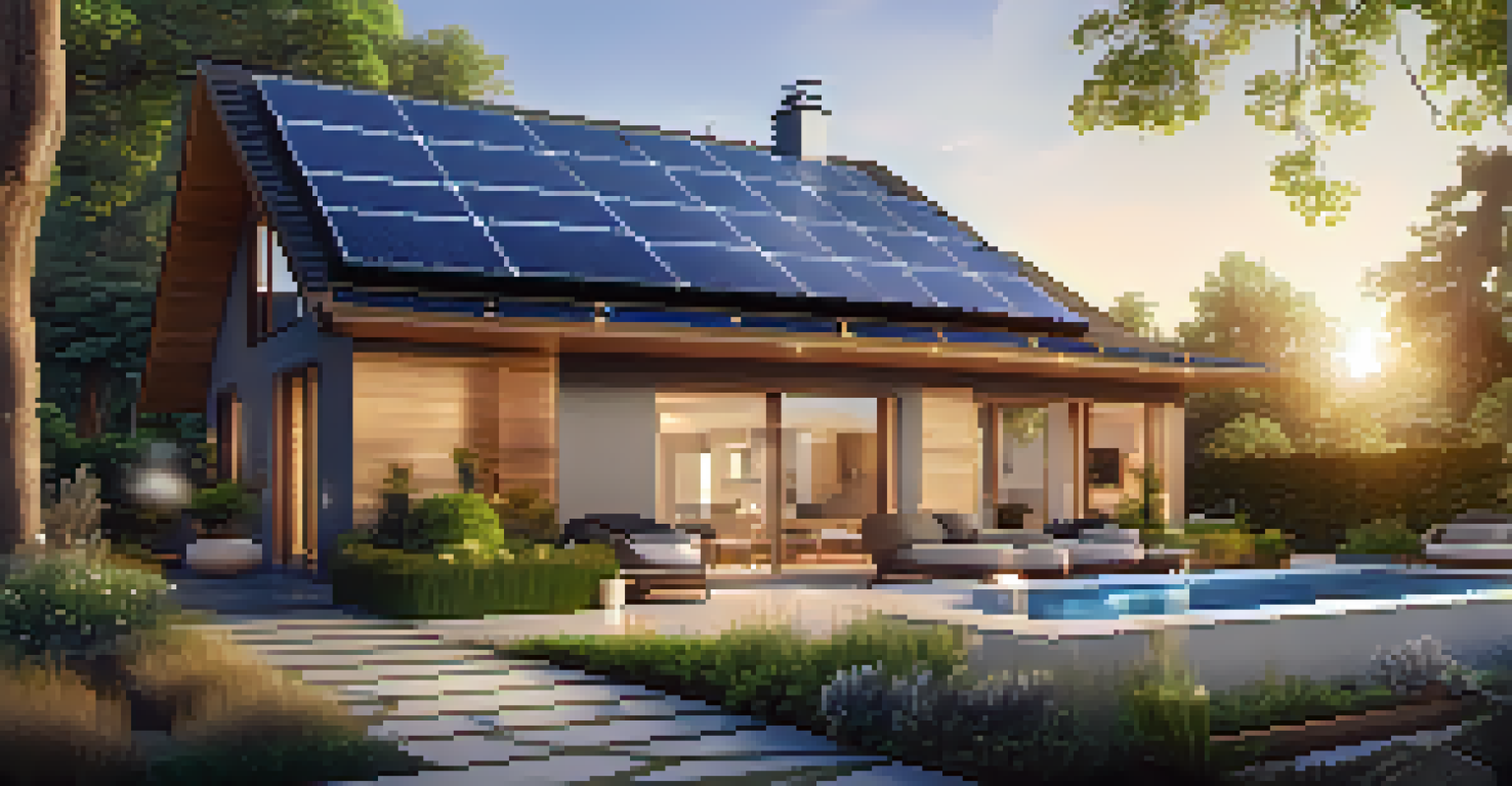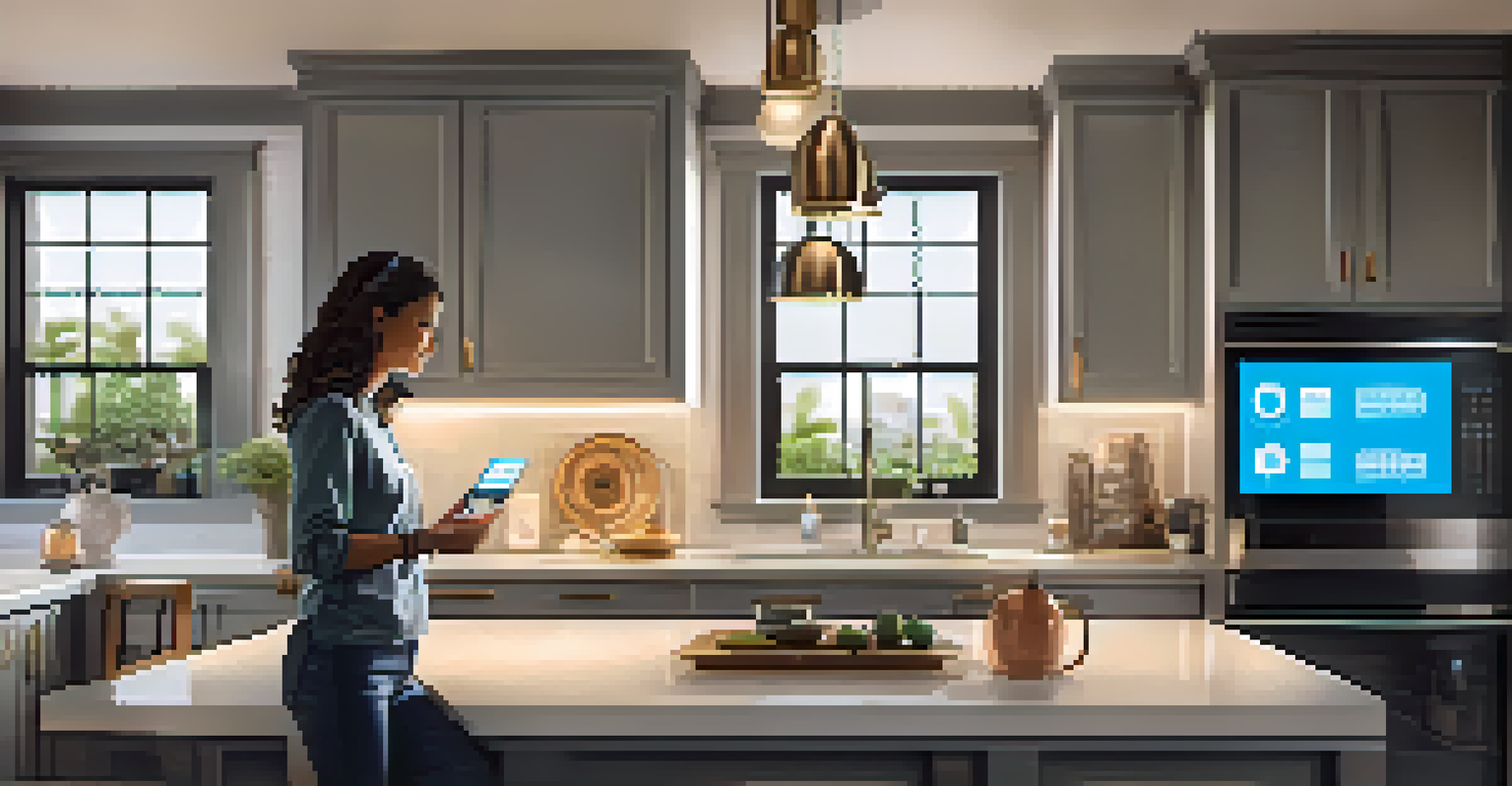The Future of Smart Home Devices: What's Next?

The Evolution of Smart Home Technology
Smart home technology has come a long way since the introduction of basic devices like programmable thermostats. Today, we’re seeing a surge in interconnected devices that offer enhanced convenience and control. As technology advances, these devices are becoming increasingly intuitive, learning our habits and preferences to simplify our daily routines.
Technology is best when it brings people together.
For example, consider how smart speakers have transformed our homes. They not only play music but also control lights, manage schedules, and even provide reminders, showcasing the interconnectedness of various smart devices. This evolution is just the beginning, as manufacturers continue to innovate and create even more seamless integrations.
Looking ahead, we can anticipate a future where smart home devices are not only interconnected but also equipped with artificial intelligence (AI) that can predict our needs. This shift will further enhance user experience and convenience, making our homes smarter than ever before.
The Role of Artificial Intelligence in Smart Homes
Artificial intelligence is set to be a game-changer in the smart home landscape. With AI, devices can analyze data and learn user behavior over time, allowing for personalized experiences. Imagine a home that adjusts its lighting and temperature based on your daily routine, creating an optimal environment without you having to lift a finger.

For instance, smart thermostats can learn when you typically leave for work and adjust the temperature accordingly, saving energy and money. This level of automation not only enhances comfort but also promotes energy efficiency, which is increasingly important in today's eco-conscious world.
AI Enhances Smart Home Experience
Artificial intelligence is revolutionizing smart home technology by personalizing user experiences and optimizing energy efficiency.
As AI continues to evolve, we can expect even more advanced features, such as voice recognition that understands context and mood. This capability will enable devices to respond more naturally to our requests, making smart homes feel more like an extension of ourselves.
Enhanced Security Features for Smart Homes
Security is a top priority for homeowners, and smart home devices are stepping up to the challenge. With advancements in technology, we now have access to sophisticated security systems that can monitor our homes in real-time. From smart cameras to doorbell sensors, these devices provide peace of mind like never before.
The future is already here — it's just not very evenly distributed.
Take, for example, smart locks that allow you to control access to your home via your smartphone. You can grant temporary access to guests or service providers without being physically present, enhancing both security and convenience. This level of control is incredibly empowering for homeowners.
As we look to the future, we can expect even more integration with AI and machine learning, enabling these security systems to identify unusual activity and alert homeowners immediately. This proactive approach to security will make smart homes safer and more secure.
Interoperability: The Key to a Seamless Experience
One of the biggest challenges in the smart home market has been interoperability among devices from different manufacturers. As homeowners invest in multiple smart devices, the ability for them to work together seamlessly is crucial for a positive user experience. Fortunately, the industry is recognizing this need and making strides towards standardization.
For instance, platforms like Google Home and Amazon Alexa are working to create ecosystems where devices can communicate regardless of brand. This means you could use a smart bulb from one company alongside a security camera from another, all controlled through a single app. The convenience of managing everything in one place cannot be overstated.
Interoperability is Essential
The future of smart homes relies on seamless interoperability among devices from different manufacturers to enhance user convenience.
Looking forward, we can expect more universal standards to emerge, allowing for greater compatibility across devices. This shift will empower homeowners to customize their smart homes without being limited to a single brand, enhancing both functionality and user satisfaction.
Sustainability and Energy Efficiency in Smart Homes
Sustainability is no longer just a buzzword; it’s becoming essential in the design of smart home devices. As awareness of climate change grows, manufacturers are focusing on creating energy-efficient products that not only reduce consumption but also seamlessly integrate with renewable energy sources. This is paving the way for greener homes.
Take smart thermostats as an example—they can optimize heating and cooling schedules based on weather forecasts, significantly reducing energy usage. Additionally, smart plugs can monitor energy consumption, allowing users to identify which devices consume the most power and make adjustments accordingly.
In the future, we can expect smart home technology to further embrace sustainability, with devices that not only manage energy use efficiently but also harness solar energy or other renewable sources. This will enable homeowners to reduce their carbon footprint while enjoying the benefits of a smart home.
Smart Home Devices for Health and Wellness
The future of smart home technology isn’t just about convenience; it’s also about enhancing our health and wellness. As we become more aware of the impact of our environment on our wellbeing, smart devices are stepping in to help us create healthier living spaces. From air quality monitors to sleep trackers, the possibilities are endless.
Consider smart air purifiers that can detect pollutants and allergens in your home, automatically adjusting their settings to improve air quality. This proactive approach can significantly benefit those with allergies or respiratory issues, promoting a healthier home environment.
Sustainability Drives Innovation
Smart home devices are increasingly focused on sustainability and energy efficiency, helping homeowners reduce their carbon footprint.
As technology progresses, we can anticipate even more innovative solutions that monitor our health and provide real-time feedback. Imagine a smart home that adjusts lighting based on your circadian rhythm or reminds you to take breaks from screens—these advancements could greatly enhance our overall quality of life.
The Future of Smart Home Control: Voice and Beyond
Voice control has revolutionized the way we interact with our smart home devices. With the rise of virtual assistants like Alexa, Google Assistant, and Siri, homeowners can control their devices hands-free, making everyday tasks more convenient. However, the future promises even more advanced control options that enhance this experience.
For instance, emerging technologies like gesture recognition and facial recognition could allow for even more intuitive interactions. Imagine being able to control your home simply by waving your hand or through facial cues—this level of convenience is on the horizon.

As we move forward, the integration of these technologies will create a more immersive and user-friendly smart home environment. The goal is to make controlling our homes feel as natural as possible, ensuring that technology enhances our lives rather than complicating them.